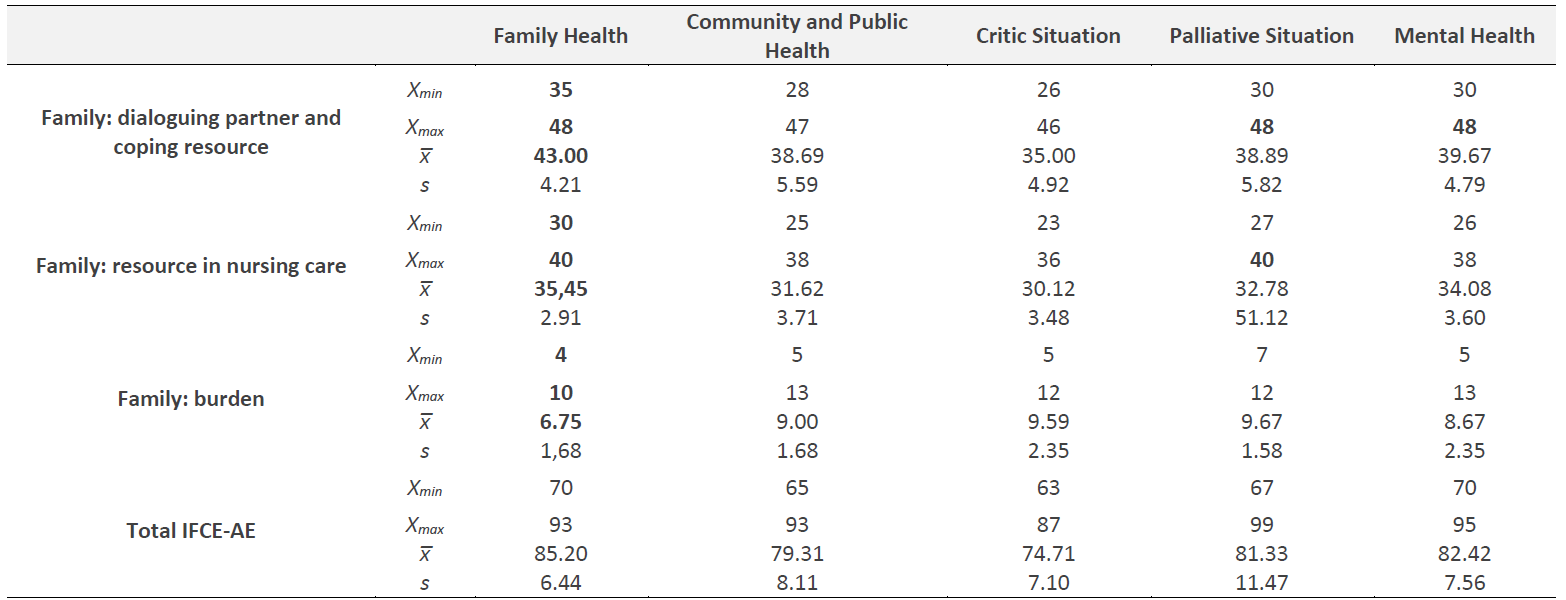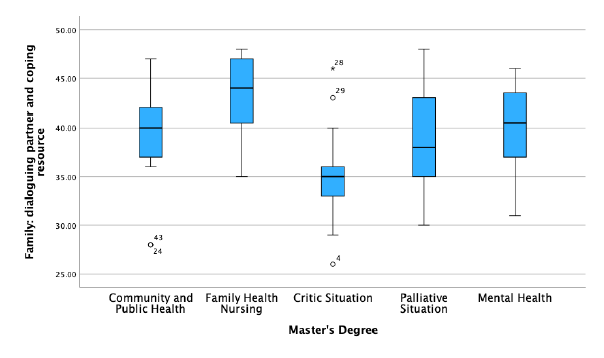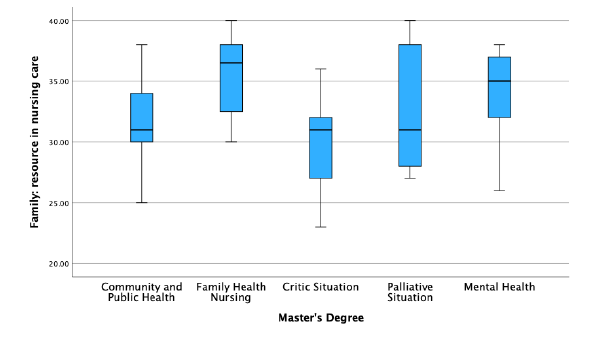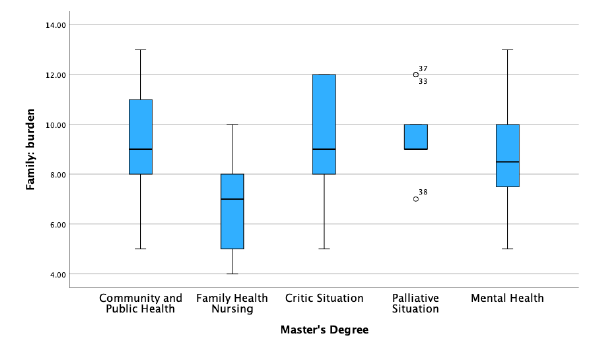Introduction
The evolution of the discipline and the nursing profession indicates the importance of recognizing the family as the care focus and as a proactive element in this process (Oliveira et al., 2011). The relationship between nurses and the family is of paramount importance for the quality of clinical practice in nursing, and several studies seek to understand the significance attributed to the family by nurses and how their attitudes towards the integration of the family in care determine their success (Frade et al., 2021). Thus, nurses' attitudes reflect their understanding of the importance of integrating them into the care process, interfering with their willingness to interact and involve families in nursing care (Oliveira et al., 2011).
Nurses, regardless of specialty, must be qualified and capable of involving families in their clinical practice, promoting the training and empowerment of families in solving their problems and promoting and maintaining family health (Frade et al., 2021).
The various master’s degree training programs in nursing incorporate different approaches to involving families. Family Health Nursing training programs were developed based on the competencies outlined by the Portuguese Nursing Order (OE) for Specialist Nurses in Community Nursing in the Family Health Nursing area (Aviso N.o 6702/2021, 2021). These programs also align with the International Family Nursing Association (IFNA) recommendations and build upon the foundational training principles outlined in their Position Statement On Advanced Practice Competencies For Family Nursing (IFNA, 2017). Will this make any difference compared to training programs with few to no family approach?
From this perspective, studying attitudes is an important assumption to improve the relationship between nurses and families in clinical nursing practice, thus emerging the following study objective: to compare the attitudes of nurses attending different master’s degrees in nursing towards the importance of involving families in care.
1. Theoretical framework
Research on nurses' attitudes towards the family indicates that when they consider family members to be important in the care process, the likelihood of initiating positive interactions increases. These interactions are influenced by their attitudes toward involving the family in the care (Nóbrega et al., 2020).
Benzein et al. (2008) defined certain attitudes grouped into dimensions, which can be positive or negative. Understanding the perspective and attitudes of nurses concerning the integration of families in the care process will allow us to know the path to follow in nursing science so that the integration of families in nursing care is an effective reality in all areas of nursing intervention (Frade et al., 2021).
A psychometric review of the different existing instruments carried out by Alfaro Díaz et al. (2019), on nurses' attitudes toward family involvement in nursing care, showed that the Family Nurse Practice Scale (FNPS) and the Families' Importance in Nursing Care - Nurses Attitudes (FINC-NA) seem to be the most appropriate for this assessment. The Portuguese version of the FINC-NA, entitled Importance of Families in Nursing Care - Nurses' Attitudes (IFCE-AE) was translated and validated by Oliveira et al. (2011) and, taking into account the theoretical content inherent to each item, the factorial load and the evaluation of the internal consistency of each dimension. The Portuguese version now consists of only three dimensions: Family: dialoguing partner and coping resource; Family: resource in nursing care; and Family: burden) and not four like the original (Oliveira et al., 2011).
Overall, the different studies analyzed showed positive attitudes of nurses toward families, which is an indicator of the integration of families in nursing care (Benzein et al., 2008; Boyamian et al., 2021; Ferreira & Kraus, 2023; Nóbrega et al., 2020; Oliveira et al., 2011; Sampaio et al., 2021; Schultz et al., 2021). Also, there are contextual variables like gender, age, marital status, educational qualifications, professional title, time, and context of professional practice that influence nurses' attitudes toward the family, but these influences are mostly not statistically significant (Boyamian et al., 2021; Fernandes et al., 2015; Ferreira & Kraus, 2023; Nóbrega et al., 2020; Sampaio et al., 2021; Schultz et al., 2021).
2. Methods
It was designed as a quantitative cross-sectional study, descriptive and correlational.
Sample
Students from the general contingent who attended the different master's degrees in nursing taught at a Portuguese nursing school were included in the study. All of these students were invited to participate in this study.
Data Collection Instruments
For data collection, it was used an adaptation of the questionnaire of the Project: 'CuidarFam' - The Family in the Process of Nursing Care, which consists of two parts: a first part for the sociodemographic and professional characterization of the participant and a second part consisting of the Scale Importance of Families in Nursing Care - Nurses' Attitudes (IFCE-AE) (Oliveira et al., 2011) in order to evaluate nurses' attitudes.
The answer alternatives are based on a Likert-type structure agreement scale, and the score obtained for each item can vary between 1 and 4 and ranges from 26 to 104 points for the entire instrument. It is considered that the higher the score obtained in the dimensions "Family: dialoguing partner and coping resource" and "Family: resource in nursing care" and the lower the score obtained in the dimension "Family: burden", the more the nurses' attitudes are supportive of the family in each of these dimensions.
The data were collected online (by a link spread by each master’s degree coordinator to students' institutional email) and in person between January 6 and February 3, 2023, ensuring confidentiality, freedom of participation, and non-duplication of responses. The research project 'CUIDARFAM' - THE FAMILY IN THE PROCESS OF CARING IN NURSING' is authorized by the Ethics Committee of the Health Sciences Research Unit: Nursing of the Nursing School of Coimbra for application in all nursing schools in the country, dated 11/9/2021 with judgment number P808-10-2021.
Statistical analysis
After the questionnaire collection phase, the data was then entered and analyzed using IBM® SPSS Statistics software, version 28.0.0 for macOS, by the principal investigator.
In this study, the internal consistency of the IFCE-EA was assessed using Cronbach's alpha coefficient. The total scale yielded a value of α=0.869, which is considered acceptable. Additionally, the dimensions "Family: dialoguing partner and coping resource" and "Family: resource in nursing care" showed values of α=0.904 and α=0.857, respectively, both of which are considered acceptable. However, the dimension "Family: burden" exhibited a lower value of α=0.651 for a total of 4 items on the scale. The Kolmogorov-Smirnov test revealed that the dimensions "Family: dialoguing partner and coping resource" and "Family: burden," as well as the overall scale, exhibit a normal distribution. However, the dimension "Family: Resource in nursing care" does not follow a normal distribution, indicating the need for non-parametric tests in the statistical analysis. The results of the Levene test, based on the median, suggest that the samples are homogeneous despite the lack of normal distribution in one dimension of the dependent variable. Descriptive statistics and dispersion measures were employed to adhere to these findings.
A margin of error of 7.97% was calculated which is higher than intended, with 5% being the most acceptable error value for the social sciences (Vilelas, 2022). Despite all efforts, the participation rate was lower than desired. Similar Cronbach Alpha values were found in the IFCE-AE original study (Oliveira et al., 2011).
3. Results
The questionnaire was made available to the entire study population, from which 71 students from the different master's degrees of the nursing school under study responded. This represents 53,38% of the original population and constitutes our sample.
Among the participants, 20 (28.2%) attended the master's course in FHS, 13 (18.3%) Community Health and Public Health Nursing, 17 (23.9%) Person in Critic Situation Nursing, 9 (12.7%) Person in Palliative Situation Nursing, and 12 (16.9%) Mental Health and Psychiatric Nursing.
The age of the participants ranges from 25 to 58 years of age, with an average age of 38 years. The majority of participants are married or live in a non-marital relationship (60.6%). The vast majority of 63 nurses (88.7%) had a bachelor's degree when this study was conducted. The study included 3 (4.2%) nurses with the title of specialist nurse 1 (1.4%) with the title of nurse manager, and the remaining participants with the title of nurse. The average length of professional experience is about 15 years, with a minimum of 1 year and a maximum of 35 years of experience.
The statistical results obtained in the application of the IFCE-AE are summarized in Table 1.
Table 1 Summary of the results obtained in the IFCE-AE

Note. N = 71. Xmin= minimum; Xmax= maximum; x̅= average; s= standard deviation; Md= median; p=significance; d=effect dimension *p < 0,05. **p < 0,01. ***p < 0,001; Bold=best result.
To assess whether the master's degree influences the nurses' attitudes toward the integration of families in nursing care, the non-parametric Kruskal-Wallis test was used, followed by the multiple comparison of the means of the orders, as described in Marôco (2021). The results showed that having a master's degree had a statistically significant impact on the dimension Family: dialoguing partner and coping resource (H(4)=19.41; p<0.001; n=71). In the multiple comparisons of the mean orders using the Pairwise method, it was found that the attitudes of master's degree nurses in Family Health Nursing significantly differ from those of master's degree students in Community and Public Health (p=0.038) and Critic Situations (p<0.001), as illustrated in Figure 1. This indicates a stronger inclination towards this dimension among the former group. Additionally, nurses with a master’s in Mental Health and Psychiatric Nursing exhibited significantly higher results compared to Critic Situation (p=0,028).
The attainment of a master's degree had a statistically significant impact on the aspect of Family: resource in nursing care (H(4)=17.69; p=0.001; n=71). Upon conducting multiple comparisons of the mean orders, it was evident that the attitudes associated with a master's degree in Family Health Nursing significantly differed from those in Critic Situation (p<0.001) and Community and Public Health (p=0.006). Additionally, attitudes observed in individuals with a master’s in Mental Health and Psychiatric Nursing were found to be notably higher compared to those with a master’s in Critic Situations (p= 0.006). Figure 2 illustrates the distribution of attitudes across all master's degrees in relation to this dimension.
The master's degree also had a statistically significant effect on the dimension Family: burden (H(4)=17.92; p=0.001; n=71). Multiple comparisons of the mean orders revealed that the distribution of attitudes related to the master's degree in Family Health Nursing presents a statistically different distribution compared with those in other areas (p=0.024 for Mental health and Psychiatric; p=0.008 for Community and Public Health; p<0.001 for Critic Situation; p=0.001 for Palliative Situation). Figure 3 illustrates the distribution of attitudes related to this dimension.
4. Discussion
Nurses are trained to advise, support, inform, and collaborate with other health professionals to train families in strategies that allow access to emotional support in complex situations, such as situations of the self-image of the compromised face for example (J. Mendes et al., 2019).
The way nurses conceptualize family care, along with their attitudes towards them, are determining factors in the decision-making, planning, and implementation of care (Frade et al., 2021).
The supportive attitudes towards the dimension "Family: dialoguing partner and coping resource" of nurses attending Family Health Nursing master's degrees are higher than those of nurses in other specialty areas. The Training Program for this area (Aviso N.o 6702/2021, 2021) defines that training in Family Health Nursing should be conducive to the acquisition of quality standards of specialized care (Ordem dos Enfermeiros, 2017; Regulamento N.o 428/2018, 2018) concerning communication and dialogue with the family, as well as in the development of family coping strategies. The application of family nursing intervention models demonstrated a reduction in the diagnoses of "ineffective family coping" (77.8%) and "ineffective family communication" (76.9%) when applied by a party in specialized training in Family Health Nursing (Ferreira et al., 2020).
The supportive attitudes towards the dimension "Family: resource in nursing care" of master's students in Family Health Nursing are statistically higher than nurses in other specialty areas in approximately 75% of cases. These results corroborate the positive evolution verified in the diagnoses of the "role of the inappropriate care provider" and knowledge of unproven role" verified in a study on the intervention of master's students in Family Health Nursing with several families (Ferreira et al., 2020). Another study states that the greater the training in the FHS, the greater the attitudes of nurses toward integrating families in nursing care (Frade et al., 2021). The specific competencies of the Family Health Nursing specialist nurse also advocate the integration of families in the patients' care plans (Regulamento N.o 428/2018, 2018). As an example, Mendes et al. (2019) argue that nurses play a key role with families in identifying cases of cyberbullying.
The perception of the family as a burden decreases when the nurse assumes the family as a partner in care, verifying a relational and therapeutic harmony between the nurse/patient/family triad (J. Mendes et al., 2019).
One primary objective of the master's degree in Family Health Nursing is precisely to provide knowledge that enhances decision-making capacity in family assessment and intervention (Aviso N.o 6702/2021, 2021). During a master’s degree in family nursing, all the training in the family as a care unit appears to shape nurses’ attitudes towards partnership and integration not seen in the rest of the master’s degree. On the other hand, for nurses who work in areas with people in critical situations (like emergency rooms or intensive care units), the priority is to perform medical tasks to save lives, whereas even person-centered care is often considered difficult (Kim et al., 2022). This could explain the difference between these two master’s degrees. Besides Family Health Nursing, the other master’s degrees in nursing do not place such a strong focus on the family. This is due to the main goals and the client of each specialty. For Public Health the client is the community. For Palliative Care the client is the patient at the end of life. In Obstetric nursing, the pregnant woman is the client, and in Pediatric nursing, it is the child. Even though they involve families in their care, their focus differs from that of Family Health Nursing. Their main concern is to intervene to solve specific problems related to their clients, for which families may provide valuable contributions.
The study limitations are that the sample only corresponds to 53.38% of the population, the fact that it was only applied in a single nursing school, and the influence of sociocultural and demographic variables. Although these limitations may affect the internal and external validity of the study, precautions were taken to ensure the quality and applicability of the study. The influence of context variables in the different analyzed studies does not seem to be statistically significant enough to carry substantial weight. The sample obtained was random and resulted from the availability of the data collection instrument confidentially to the entire study population. The most powerful statistical tests were also chosen.
It would be important to replicate this study in different nursing schools to confirm whether a master's degree in FHS leads to an increased supportive attitude toward the family among nurses.
Conclusion
In general, the nurses from all different master’s degrees who participated in this study revealed a. positive attitude toward the importance of including families in nursing care, and this is conducive to the nursing profession. To address this, nurses need to be equipped with a comprehensive understanding of family dynamics, as well as the skills for family assessment and intervention during their training.
This study found that nurses who attend the master's degree in Family Health Nursing at the nursing school in the study assume greater attitudes toward partnership, coping, and inclusion of family in care and have a lower perception of the family as a burden. On the other hand, the nurses who attended the Person in Critic Situation master’s degree showed the lowest scores, which were statistically significant. This suggests that the unique characteristics of the Family Nursing training program enhance communication, support, and integration of care toward families, thereby enhancing their practice in comparison to other master’s degrees in nursing.
Author contributions
Conceptualization, P.S., M.T., M.C.L. and J.F.; data curation, P.S., M.T., M.C.L. and J.F.; formal analysis, P.S., M.T., M.C.L. and J.F.; investigation, P.S.; methodology, P.S., M.T., M.C.L. and J.F.; project administration, P.S. and M.C.L.; resources, P.S.; software, P.S.; supervision, M.T., M.C.L. and J.F.; validation, P.S., M.T., M.C.L. and J.F.; visualization, P.S., M.T., M.C.L. and J.F.; writing-original draft, P.S. and M.T.; writing-review and editing, P.S., M.T., M.C.L. and J.F.


















